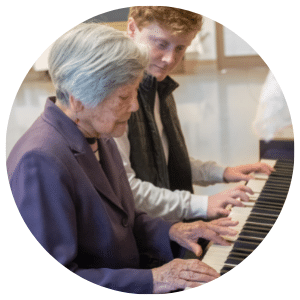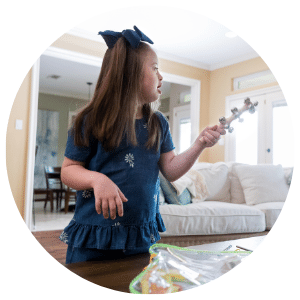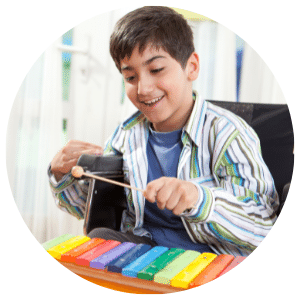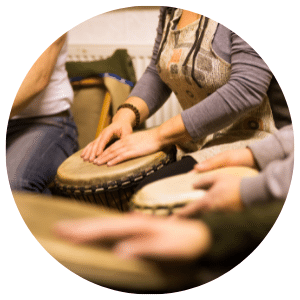What is Music Therapy?
Music appeals to us all and music therapy can be accessed by anyone. It is a proven clinical intervention that enhances quality of life by offering opportunity for meaningful relationship building, self-expression, creativity and communication.
The therapist works either individually with a client, or with a number of clients, in a music therapy group, and the aims are to meet social, emotional, cognitive, physical, learning and communication needs.
All of the music is improvised and our therapist uses their own music to encourage play, self-expression and communication.
We use a variety of instruments such as the piano, guitar, xylophones, drums and other percussion, all of which are available to be freely used by our clients.
The Evidence
It is essential that we are accountable and can prove the efficacy of our practice. British Music Therapists are working hard to compile a bank of evidence to support our work. This helps us to communicate the process of our practice with other professionals, to engage further referrers and develop our work.
We share the most up-to-date music therapy research via our blogs and social media and we also publish the findings of our projects. Our most recent work entitled ‘An exploration in to the efficacy of music therapy with Deaf populations’ in collaboration with Action for Deafness can be shared upon request. Following every collaboration, pilot and project we review, collate and make public our findings. Please contact us for any further information or click on the icons to link to the NHS, British Medical Journal, British Association of Music Therapy or the Cochrane Library.
‘Music Therapist’ is a protected title and all music therapists are allied health professionals who must be registered with the Health and Care Professions Council (HCPC). British music therapists have Masters degrees and throughout their career engage in monthly supervision and continued CPD.




How can music therapy help?
Develop skills such as turn-takingEnhance fine and gross motor skills
Explore challenging behaviourFacilitate communicationReduce stress and anxiety
Enable the release of feelingsEncourage vocalising and verbal skillsProvide a creative space
How can music therapy help?
Music therapy can |
|||
|---|---|---|---|
| Reduce stress and anxiety. | Facilitate communication. | Build relationships and develop interactions. | Enable an individual to experience and process difficult feelings non-verbally. |
| Provide a space where the client can be freely creative. | Increase awareness of self and others. | Practise social skills. | Provide an opportunity to build confidence and a sense of agency. |
| Enhance motor skills, fine and gross. | Encourage vocalising and verbal skills. | Develop skills such as turn-taking. | Explore challenging behaviour. |
| Support aspects of stages of development, including non-verbal interaction, play and language. | Provide a safe and cathartic space for the release of feelings. |
Music therapy can
- Reduce stress and anxiety.
- Facilitate communication.
- Build relationships and develop interactions.
- Enable an individual to experience and process difficult feelings non-verbally.
- Provide a space where the client can be freely creative.
- Increase awareness of self and others.
- Practise social skills.
- Provide an opportunity to build confidence and a sense of agency.
- Enhance motor skills, fine and gross.
- Encourage vocalising and verbal skills.
- Develop skills such as turn-taking.
- Explore challenging behaviour.
- Support aspects of stages of development, including non-verbal interaction, play and language.
- Provide a safe and cathartic space for the release of feelings.
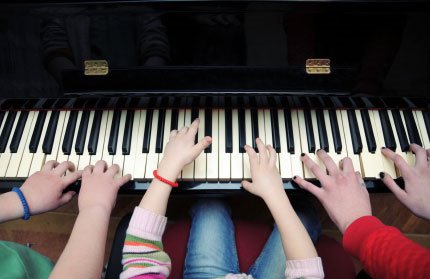
Who We Help
At Waves we aim to ensure that there are no barriers to accessing our service and we aim to reach the most vulnerable and isolated people in our community and offer meaningful, therapeutic connection.
We work in settings that range from neonatal work to end-of-life care and we support people with mental health, learning, physical, social, emotional and communication needs.
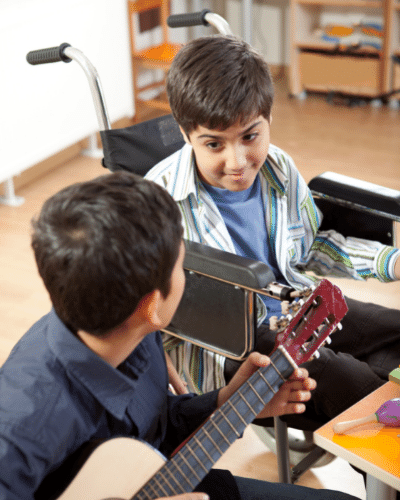
Our areas of speciality include
- Pregnant women
- Children (from early-years onwards)
- Persons with autism
- Families
- Palliative Care
- Persons with emotional & behavioural disorders
- Persons with profound needs
- Persons with complex trauma & attachment
- Forensic scientists
- Hospital ward patients
- Dementia suffers
- Persons in addiction rehabilitation
- Clients with COVID-19 related issues
- Persons with sensory impairment
- Persons with anxiety and depression
Testimonials
I have a ten year old adopted son who has been lucky enough to work with Waves Music Therapy for the last few months. He has a complex presentation and struggles to feel comfortable with and manage his emotions. This influences all aspects of his everyday life.The impact of Waves therapy has been amazing and far greater than any other therapy he has experienced. His therapist Vicky has a true understanding of trauma, trauma behaviour and how to respond in an intuitive, patient and empathetic way. This has enabled our son to form a safe attachment with Vicky, as he feels both seen and understood. For a child who has suffered major attachment disruption in his early life, to achieve this level of natural connection with another person in such a short space of time, has been both surprising and heartwarming to witness. As so often trauma is held in the body, then any creative outlet such as art or music has a far greater impact on repair than any cognitive therapies can achieve. Waves provides a safe space where he can create and feel the music, feel his emotions and feel them more. He has been able to experiment with a variety of instruments, write songs about his inner most thoughts and even bring other trusted adults into his safe space to create music together. Waves Music therapy has contributed significantly to our son developing a new sense of emotional awareness and he is now starting to both understand and openly question his feelings with us. We would highly recommend Waves Music Therapy and we cannot thank you enough.
There is no other time in the week where I see … relax. He comes into the therapy room, sees Victoria and immediately settles. He knows, he understands this is his time and he chooses to communicate and play.
Music therapy is a special time for our students. The session is totally child-led, every sound develops from the sounds and movements our students make. It is incredibly important for our students that they have this time to play together.
I have worked with Victoria for many years and have co-run sessions with her. Music Therapy is an amazing way for us to reach our profoundly autistic children. Music therapy does not place demands upon the child, they make music and play because they want to, because Victoria draws them out. They are working on their social, their emotional, their communication skills. Music therapy is essential for our children here.
Music therapy is an essential part of school life for our children. Our children need a way to express themselves and explore their emotions. Music therapy meets these needs.
I have supported ‘Lucy’ for 4 years. I have never heard her make the sounds she does like when she is in music therapy. It is like she is really motivated to sing, to communicate. I am usually in tears.
Sienna is so enjoying her sessions with Gabrielle – a small taste of normality
